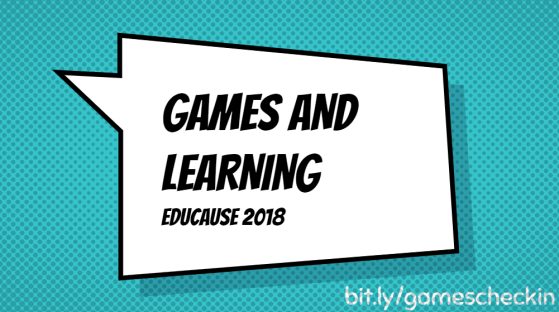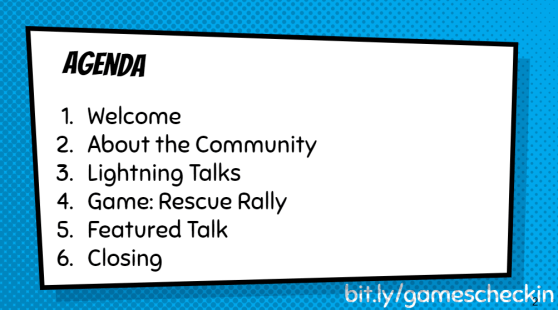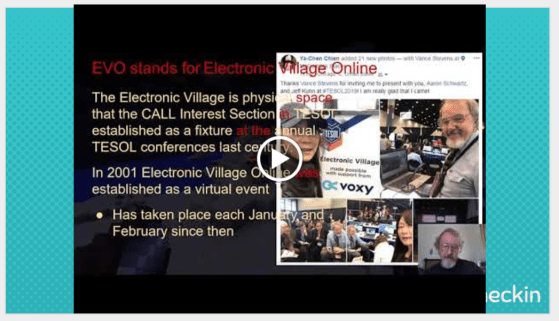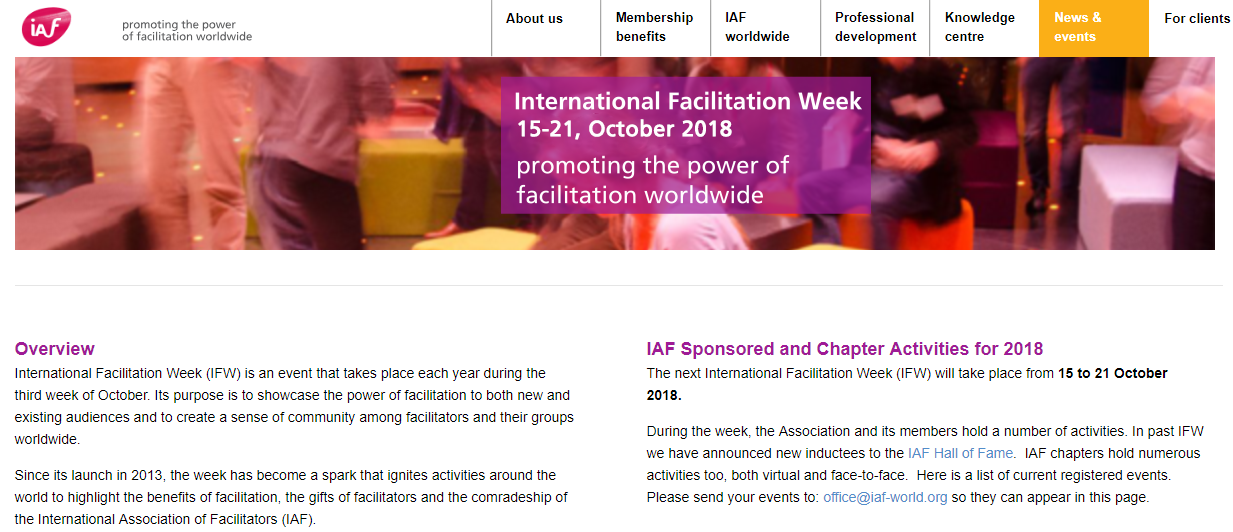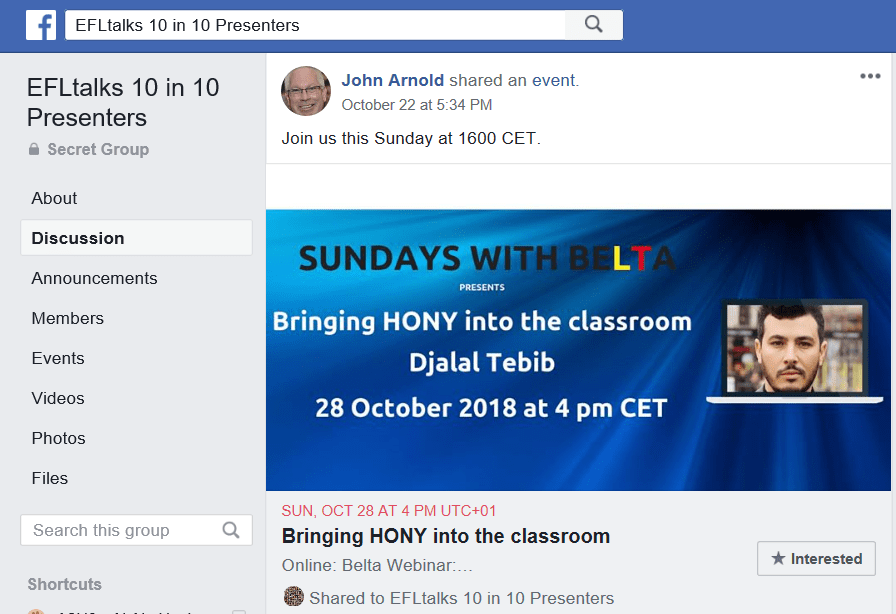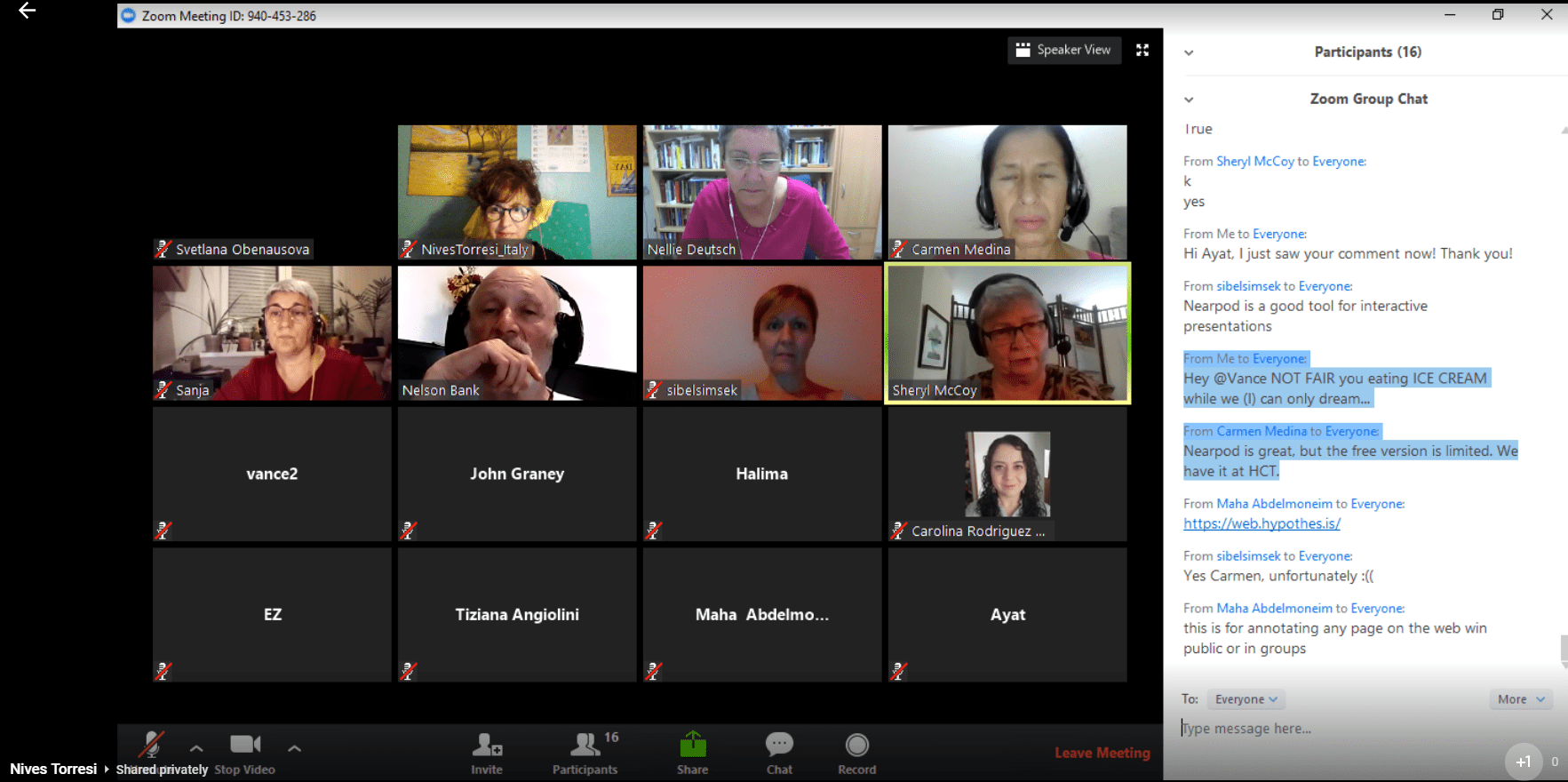Learning2gether Episode 396
On November 16, 2018, Vance Stevens presented ‘Gamifying Teacher Professional Development through Minecraft MOOC’ at WorldCALL 2018
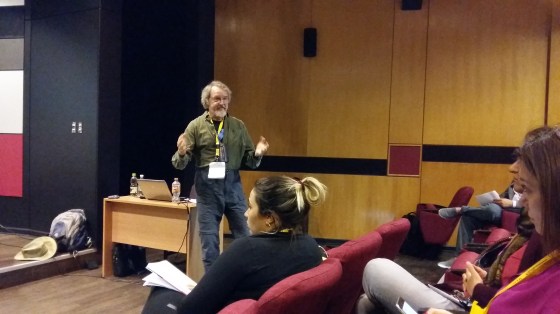 Picture credit: Susan Mirandi
Picture credit: Susan Mirandi
This was my proposal:
Abstract
EVO Minecraft MOOC is an ongoing community of practice of language teaching practitioners which invites newcomers to join in every January / February and then continues throughout the year with a dedicated group of teaching peers who have been interacting online in Minecraft for the past 4 years. This presentation explains how the group was formed, how it functions, and what we have learned about gamifying learning by experiencing it ourselves when playing the game Minecraft with one another. More importantly we reflect continually on how this informs our approach to teaching and learning. This presentation shares our insights and perspectives with our audience and invites them to join us online if they wish to learn more about what gamification feels like as a learning experience.
Summary
Electronic Village Online is an annual teacher training event run under the auspices of TESOL CALL-IS. EVO Minecraft MOOC is a 5-week session that has taken place in Minecraft, a wiki, and Google+ Community space each Jan / Feb since 2015. The presenter conceived the idea for EVO Minecraft MOOC as a way that he himself could develop expertise in the game and thereby use it with students. Other teachers were attracted to the concept, including some who had some experience in the game. Participants were attracted to the session for the same reasons — not that their learning paths had been prescribed for them in a neatly pre-set syllabus but that by entering the “game” or session, learning would happen for them in a way that participants would come to understand by experiencing the process that Ito et al (2010) characterize as “hanging out, messing around, and geeking out.”
We have found that Minecraft is capable of reversing the normal student teacher dichotomy whereby teachers traditionally are assumed to know more than their students. We have found through the experience of participants in our EVO session that that participants tend to take charge of their learning by guiding one another in the vagaries of the game.
This presentation explains what teachers (who are learning about the game through the experience of playing it as learners) are learning about designing worlds within the game context that will meet their curriculum objectives and create an engaging and enjoyable experience and task-based environment for learners. But above all, the paper explores how teachers can be made aware of the affordances of Minecraft by creating such spaces for one another and interacting in those spaces. It also serves as an example of how we teachers can use what we have learned through our experience with MOOCs to form communities of practice to reboot our own learning, using the community as curriculum (Cormier, 2008).
Here are the slides:
I converted this into a script for a 5 minute trailer entitled
Learn to engage your students in a gamified classroom through experiencing the participatory culture inherent in Minecraft by interacting with like-minded teaching peers in EVO Minecraft MOOC
Hi, my name is Vance Stevens. I’ve been teaching English to speakers of other languages for over 40 years. My methods have evolved over the years from the behaviorist and cognitive approaches prevalent when I started teaching, through more communicative approaches, teaching through communities of practice, through connectivism, and most recently through gamification.
Minecraft is a game that for the past decade has caught and sustained the attention of teachers wanting to introduce elements of gamification into their classrooms. However, there are two steep hurdles for teachers: (1) First is the complexity and depth of the game itself, and (2) secondly, understanding how students will interact and communicate with each other in Minecraft by engaging in self-directed critical and collaborative learning. I started EVO Minecraft MOOC to address and resolve both these problems.
EVO stands for Electronic Village Online. The actual Electronic Village is physical space that the CALL Interest Section in TESOL established as a fixture at annual TESOL conferences way back last century. In 2001 Electronic Village Online was established as a virtual event taking place each January and February ever since then. EVO consists of a baker’s dozen of sessions on topics proposed by language teachers who develop their proposals into training courses of interest to other teachers. Session moderators work from passion, no one is paid, no one pays, it’s free, and it happens every January-February. Find out more at http://evosessions.pbworks.com
EVO Minecraft MOOC is one of these sessions. We started it in 2015 and it has since become an ongoing community of practice of language teaching practitioners which invites newcomers to join in every January / February and then continues throughout the year with a dedicated group of teaching peers who have been interacting online in Minecraft for coming on 5 years now.
In November 2018 I’m presenting at WorldCALL 2018, in Concepción: Chile, about our work in EVO Minecraft MOOC. The presentation explains how the group was formed, how it functions, and what we have learned about gamifying learning by experiencing it ourselves when playing the game Minecraft with one another. More importantly we reflect continually on how this informs our approach to teaching and learning. This presentation shares our insights and perspectives with our audience and invites them to join us online if they wish to learn more about what gamification feels like as a learning experience.
As EVO Minecraft MOOC prepares to enter its 5th year engaging teachers hands-on with peers in the participatory culture their students will experience when playing the game of Minecraft, this presentation invites you to join us.
Writeup for the WorldCALL 2018 conference proceedings
Presenters have been invited to prepare a 1000 word article describing their presentations. What follows is a version that is almost twice that length, but contains about what I would like to say. I’ll have to cut my submission back substantially, but I am blogging the expanded version here:
1. Introduction
Minecraft is a game that for the past decade has caught and sustained the attention of teachers wanting to introduce elements of gamification into their classrooms (Dikkers, 2015). However, there are two steep hurdles for teachers: the complexity and depth of the game itself, and understanding how students will interact and communicate with each other in Minecraft by engaging in self-directed critical and collaborative learning (Kuhn & Stevens, 2017). EVO Minecraft MOOC was formed to resolve both these problems.
Electronic Village Online (EVO) is an annual professional development event established in 2001 under the auspices of TESOL CALL-IS and has taken place every January / February since then (Hanson-Smith & Bauer-Ramazani, 2004). EVO consists of a baker’s dozen of sessions on topics proposed each year by language teachers who develop their proposals into training courses of interest to other teachers. Moderators hope only to learn by teaching others, and participation is open to anyone free of charge.
EVO Minecraft MOOC is one of these sessions. Since it was started in 2015 it has become an ongoing community of practice (CoP) of language teaching practitioners which invites newcomers to join in every January / February and then uses its server for community development throughout each year. The community explores how teachers can be made aware of the affordances of Minecraft by creating virtual spaces for one another and interacting in those spaces. The core group of moderators have for the most part been returning year after year to sustain their practice of teaching languages and enhancing the professional development of peers through Minecraft. Participants who enjoy playing and learning with us often join the team.
This paper explains what teachers participating in EVO Minecraft MOOC are learning about the game through the experience of playing it as learners, and what they are learning about designing worlds within Minecraft that will meet their curriculum objectives and create an engaging and enjoyable experience and task-based environment for learners.
2. How Minecraft MOOC was formed and how it functions
The author has been teaching English to speakers of other languages for over 40 years. His methods have evolved over the years from the behaviorist and cognitive approaches prevalent when he started teaching (references), through more communicative approaches (references), teaching through communities of practice (references to Wenger, Lave), through connectivism (Downes, Siemens), and most recently through gamification (Gee, references).
The author became interested in Minecraft after hearing other teachers enthusiastically describe in podcasts how they were using the game with students ever since Minecraft was created by Mojang in 2009, but he was thwarted in finding a community of learners actively playing who would accept an adult in their midsts. Eventually he conceived the idea of forming EVO Minecraft MOOC as a way that he himself could develop expertise in the game and thereby use it with students.
The seed took root when the author collaborated at a distance with a Croatian colleague on an article in which she interviewed her 11-year old son on how he had become fluent in English by engaging with other European players in Minecraft, even starting his own YouTube channel (Smolčec, Smolčec, & Stevens, 2014). In conducting the literature search for that article the author discovered other teachers using Minecraft in language learning. When he proposed an EVO session on the topic, he invited Jeff Kuhn and David Dodgson to join the effort, and both accepted. Jeff Kuhn set up our first Minecraft server and other teachers were attracted to the concept, including some who already had considerable experience in the game and were able to help mentor the developing Minecraft literacy of others (Stevens, 2017).
Minecraft MOOC takes place primarily online in Minecraft. In order to attract new participants we renew our proposal each year to become an EVO session and invite people to join us at our Google+ Community (G+C), where we can interact asynchronously. In addition to a syllabus, we also have a wiki at http://missions4evomc.pbworks.com/ where we can suggest a structure for the course.
Although we have always had a syllabus, participants are attracted to the session not because their learning paths have been prescribed for them but because by entering the game, learning happens for them in a way that participants come to understand by experiencing the process. Ito et al (2010) characterize the steps in the process gamers go through as “hanging out, messing around, and geeking out,” and this is what happens with people who join us without much knowledge of Minecraft apart from a vague interest in using it with their students. Those who persist eventually become remarkably creative and capable of guiding other teachers, and their students, into adapting the game to their diverse learning goals. Our session applies the community as curriculum model whereby the community negotiates the operative syllabus for the MOOC (Cormier, 2008).
3. Discussion
This section discusses what we have learned about gamifying learning by experiencing gamification ourselves when playing the game Minecraft online with one another. First of all we have penetrated the Minecraft community of learners by becoming learners in Minecraft ourselves, learning hands-on how gamification works and might apply to our own contexts. In so doing, we come to grips with the complexity and depth of the game, understanding through doing it ourselves how students will interact and communicate with each other in Minecraft (in our case using the text chat native to Minecraft as well as Discord, a 3rd-party VOIP app frequently used by gamers, to speak to one another while in-world). Through carrying out our own projects, such as discovering temples, both on land and underwater, and excavating them for their loot, we engage in self-directed, spontaneous learning.
Through experiencing the game ourselves, we see how Minecraft brings essential skills such as critical thinking, collaboration, problem solving, and language and communication skills to bear on a range of concepts including, architecture, engineering, chemistry, mathematics, coding, history, and the list goes on and on.
This article has already cited one example of students using Minecraft to practice and improve learning a foreign language (Smolčec, Smolčec, & Stevens, 2014). That article cites many other instances, including the work of Jeff Kuhn who used Minecraft to generate ideas for ESL students writing about disaster management, and Dave Dodgson using Minecraft in Turkey in an EFL context (see also their more recent articles: Kuhn, 2015; and Dodgson, 2017).
We have found that Minecraft is capable of reversing the normal student-teacher dichotomy whereby teachers traditionally are assumed to know more than their students. We have found through the experience that participants tend to take charge of their learning by scaffolding one another in the vagaries of the game. We have also seen when, as often happens, teachers bring their children with them into the game, that these kids often become proficient more quickly than their parents, and mentor not only their parents but other adult players as well. Through this we see that a productive strategy of using Minecraft with younger students would be to set up a play space for them, encourage them to set their own goals within the curriculum, and empower them to become the experts, even to the extent of teaching the teacher how to use Minecraft to learn more about their curriculum.
More importantly we reflect continually on how what we learn through our experience collaborating with each other in-world informs our approach to teaching and learning. Our G+C has been an ideal space for sharing our screenshots and videos from in-world, and conversations around all our topics of interest ranging from helping noobies to showing each other our builds and projects. Lately we have discussed there how to replace our G+C when Google drops support for the platform in April, 2019. Meanwhile we are looking into alternatives such as Google Classroom and Moodle. We don’t intend to let what happens with G+C curtail our learning in the 2020 rendition of EVO Minecraft MOOC.
4. Conclusions
In our proposal and session materials, we invite other teachers to join us who consider themselves to be teachers with a gaming problem, gamers with a teaching problem, and teachers of gamers with a learning problem. By this we mean to address teachers who don’t already play games but would like to understand how gamification might work in their teaching contexts; teachers who already play games and would like to adapt what they know to teaching their students, and teachers who see that their students like games, and want to know how they might leverage this by fitting Minecraft into their curriculum. We consider it axiomatic that when asked by skeptics if Minecraft is in the curriculum, the reply is usually that the curriculum is somewhere in Minecraft already. We encourage our peers to join us so that together we can figure out how and where Minecraft can be utilized in anyone’s teaching curriculum.
By the time these proceedings are published, the Minecraft MOOC EVO session for 2019 will have completed its 5th year as a formal session engaging teachers hands-on in the participatory culture their students will experience when playing the game of Minecraft. However, we expect there will be an EVO Minecraft MOOC in 2020, in which case we invite any interested participants to join us. We can be easily found via EVO, http://evosessions.pbworks.com/ or in a Google search on EVO Minecraft MOOC.
5. References
Cormier, D. (2008). Rhizomatic education: Community as curriculum. Innovate, 4(5). Reprinted with permission of the publisher; available:
http://davecormier.com/edblog/2008/06/03/rhizomatic-education-community-as-curriculum/.
Dikkers, S.(Ed.). (2015). Teachercraft: How teachers learn to use Minecraft in their classrooms. Available from http://press.etc.cmu.edu/fies/Teacher-Craft_Dikkers-etal-web.pdf
Dodgson, D. (2017). Digging deeper: Learning and re-learning with student and teacher Minecraft communities. TESL-EJ, Volume 20, Number 4, Available: http://www.tesl-ej.org/wordpress/issues/volume20/ej80/ej80int/. Also available at: http://www.tesl-ej.org/pdf/ej80/int.pdf; pp. 1-12 in pdf.
Hanson-Smith, E. & Bauer-Ramazani, C. (2004). Professional Development: The Electronic Village Online of the TESOL CALL Interest Section .TESL-EJ 8, 2.(On the Internet) http://tesl-ej.org/ej30/int.html.
Ito, M., Baumer, S., Bittanti, M., boyd, d., Cody, R., Herr-Stephenson, B., Horst, H., Lange, P., Mahendran, D., Martínez, K., Pascoe, C., Perkel, D., Robinson, L., Sims, C., & Tripp, L. (2010). Hanging out, messing around, and geeking out. Cambridge, MA: The MIT Press. Available: https://www.academia.edu/4898770/Ito_Mizuko_S._Baumer_M._Bittanti_d._boyd_R._Cody_R._Herr-Stephenson_H._Horst_et_al._2010_Hanging_Out_Messing_Around_and_Geeking_Out_Kids_Living_and_Learning_with_New_Media._Cambridge_MIT_Press and https://www.dropbox.com/s/h69b0vyd6tumixw/8402.pdf?dl=0
Kuhn, J. & Stevens, V. (2017). Participatory culture as professional development: Preparing teachers to use Minecraft in the classroom. TESOL Journal 8, 4:753–767. https://doi.org/10.1002/tesj.359 and http://onlinelibrary.wiley.com/doi/10.1002/tesj.359/full
Kuhn, J. (2015). Meaningful Play – Making Professional Development Fun. TESL-EJ, Volume 18, Number 4, Available: http://www.tesl-ej.org/wordpress/issues/volume18/ej72/ej72int/. Also available at: http://tesl-ej.org/pdf/ej72/int.pdf; pp. 1-8 in pdf.
Smolčec, M., Smolčec, F. and Stevens, V. (2014). Using Minecraft for Learning English. TESL-EJ 18, 2. Available: pp. 1-15 in http://www.tesl-ej.org/pdf/ej70/int.pdf
Stevens, V. (2017). Gamifying Teacher Professional Development through Minecraft MOOC. In Zoghbor, W., Coombe, C., Al Alami, S. & Abu-Rmaileh, S. (Eds.). Language Culture Communication: Transformations in Intercultural Contexts. The Proceedings of the 22nd TESOL Arabia Conference. Dubai: TESOL Arabia. Pages 75-92. Available: http://vancestevens.com/papers/evomcmooc_TACON2016.pdf and in readable text at
https://docs.google.com/document/d/1sfJX4ytxWcR_f2f26_eEu79Ukqb31t9VkglbXSdsxls/edit?usp=sharing

Mark Pegrum (to my left, above) included a summary of my presentation in his blog post here: http://elanguage.edublogs.org/2018/11/15/global-call-gathering-in-latin-america/
“In his presentation, Gamifying teacher professional development through Minecraft MOOC, Vance Stevens explained that over the last 40 years he has taught English through behaviourist and cognitive approaches, then communicative approaches, followed by communities of practice, connectivism (aligned with the original idea of MOOCs as community-driven), and most recently gamification. He indicated that Minecraft has caught the attention of many educators over the last decade; it promotes critical thinking, collaboration, problem-solving, language and communication, and has been used for architecture, engineering, chemistry, mathematics and coding, in addition to language teaching. Gamification, he said, is about learning not in a top-down format, but by exploring in a bottom-up way. The challenges for teachers are: penetrating Minecraft communities of learners; the complexity and depth of the game; and understanding how students will interact and communicate with each other in Minecraft, and how they will engage in self-directed critical/collaborative learning. The EVO Minecraft MOOC started in 2015 to address and resolve these problems, and newcomers are welcomed every January/February.”

Here are some more photos taken by Susan Mirandi, during the presentation:
In the course of preparing for my presentation I produced a “lightning talk” which I blogged here
https://learning2gether.net/2018/11/01/vance-stevens-presents-lightning-talk-on-engaging-students-in-gamified-classrooms-using-minecraft/
The lightning talk took the form of this 6 minute video, which was a precursor to my longer talk in Concepción:
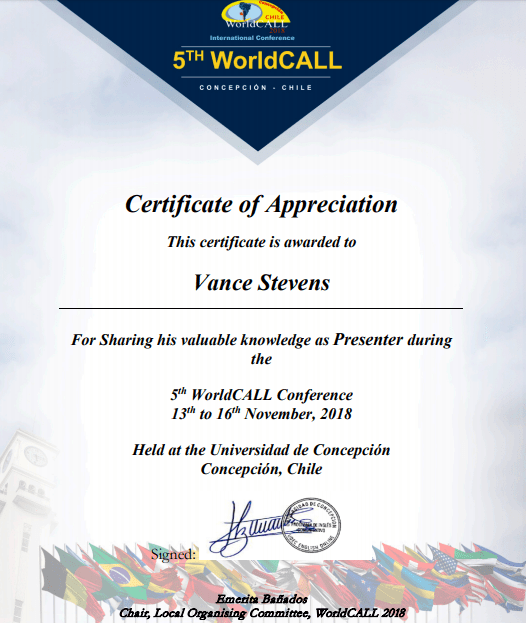
This longer talk was presented at the …
Nov 13-16 WorldCALL 5 – Universidad de Concepción Chile
Conference page: http://worldcall5.org/
Accepted abstracts
http://worldcall5.org/images/WorldCall5/ACCEPTED_ABSTRACTS_WORLDCALL_2018_v2.pdf

My paper is listed on p.3 in the list of abstracts, entitled
Gamifying teacher professional development through Minecraft MOOC

Earlier events
Mon Nov 1 1545 UTC Vance Stevens presents lightning talk on Engaging students in gamified classrooms using Minecraft
Sun Nov 4 1700 UTC EVO Moderator Development live session 3
Where: presumably https://zoom.us/j/940453286
When: presumably Nov 4th, 2018 6PM UTC
Here’s the link to the revised slide show for Week 3:
https://docs.google.com/presentation/d/1EjaIHFGmtQJsSnprQ3DQ7wfLdu0jdjP4j_LuDqePLp8/edit?usp=sharing
Nives Torresi has provided this link to the chat transcript from the meeting
https://drive.google.com/file/d/177SkHBzIlYQxwpQH76lpAEWE2tngHFdt/view
The link to the live recording should eventually appear here
http://evopd.pbworks.com/w/page/128248656/Recordings%20of%20Live%20Events
Sun Nov 4 0001 UTC to 2000 UTC YLTSIG Annual Web Conference
https://drive.google.com/file/d/1bB7OqfT-4iXF151o6n_8J2soJUJq-V5b/view

Heike Philp tracked presentations at this conference with a series of tweets







Mon Nov 6 0100 UTC Dakota Redstone at VSTE Minecraft Mondays
MINECRAFT MONDAY
Monday, November 5th, EST, we will meet at VSTE Place to work on a neighborhood which Dakotah_Redstone has already begun. Each person may try recreating their own home in the neighborhood. We will meet at 8 PM Eastern.
Time where you are:
This week we will look at two resources our members have shared: music creation: within Minecraft using Note Blocks and red stone, and 101 Build Hacks. Both can help us furnish our homes!
You must have a computer Minecraft account from https://minecraft.net/en/ to join. There is a one time fee of $26.95. Download and install the software. Choose multiplayer and add a server: Name VSTE Place IP 69.175.17.26:25565 Our server is protected. If you want to be whitelisted to enter anytime you want to continue building this, or anything else, email Kim Harrison at K4sons@gmail.com or kvharris@vbschools.com from an educational email address with your real name and minecraft name.
We are currently using Minecraft version 1.12.2
Thu Nov 8 at 2000 UTC next event in e-Learning 3.0 – Connectivist learning by Stephen Downes
The materials that were here have been posted to
https://learning2gether.net/2018/12/17/learning2gether-with-stephen-downes-about-elearning-3-0/
Fri Nov 9 1300 to 1700 UTC – IATEFL LTSIG and TESOL CALL-IS joint online event on AI in ELT – Friend or Foe
9 November 2018, 1pm GMT – 5pm GMT
IATEFL LTSIG and TESOL CALL-IS joint online event
This is the call for proposals page
The role of Artificial Intelligence (AI) in ELT: friend or foe?
A 4h online event on AI, an innovative mix of 15min ‘input’ presentations and 30min audience participation sessions.
****
|
|||||
|
|||||
Fri Nov 9-10 Rockcliffe University Consortium Conference – The Future Present
The Rockcliffe University Consortium Conference: The Future Present took place on November 9-10, 2018 at the Fort Mason Center, San Francisco, California
Registration closed Sept 30, 2018 but there is supposed to be virtual participation possible (I don’t see how, and it might not be free, but stay tuned)
https://rucc.confcenter.org/2018futurepr
Sun Nov 11 final live online chat for EVO moderators development
Slides: https://docs.google.com/presentation/d/1Wx6WvsnIf9drHh_hs_jnhRYTnyD-Wh1xbOpxwHCO6os/edit?usp=sharing
This is what it was about
http://evopd.pbworks.com/w/page/128243469/Week4_2018
Nives Torresi posted the chat transcripts here
https://drive.google.com/file/d/18LEdKJMo3pcTiyPhug4ELQV8H2TgmzRT/view
The slides used for the event
https://docs.google.com/presentation/d/1Wx6WvsnIf9drHh_hs_jnhRYTnyD-Wh1xbOpxwHCO6os/edit?usp=sharing




